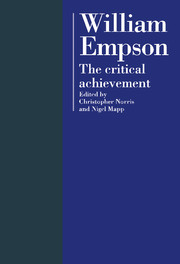Book contents
- Frontmatter
- Contents
- Contributors
- Foreword
- 1 Introduction: Empson as literary theorist: from Ambiguity to Complex Words and beyond
- 2 Empsonian honesty and the beginnings of individualism
- 3 Empson, Leavis, and the challenge of Milton
- 4 Empson's Satan: an ambiguous character of the seventh type
- 5 Compacted doctrines: Empson and the meanings of words
- 6 Figural narrative and plot construction: Empson on pastoral
- 7 More lurid figures: de Man reading Empson
- 8 Fool and pharmakon
- 9 William Empson's cosmicomics
- 10 Empson as teacher: the Sheffield years
- References
- Index
3 - Empson, Leavis, and the challenge of Milton
Published online by Cambridge University Press: 01 June 2011
- Frontmatter
- Contents
- Contributors
- Foreword
- 1 Introduction: Empson as literary theorist: from Ambiguity to Complex Words and beyond
- 2 Empsonian honesty and the beginnings of individualism
- 3 Empson, Leavis, and the challenge of Milton
- 4 Empson's Satan: an ambiguous character of the seventh type
- 5 Compacted doctrines: Empson and the meanings of words
- 6 Figural narrative and plot construction: Empson on pastoral
- 7 More lurid figures: de Man reading Empson
- 8 Fool and pharmakon
- 9 William Empson's cosmicomics
- 10 Empson as teacher: the Sheffield years
- References
- Index
Summary
William Empson's and F. R. Leavis's work on Milton exemplifies a form of oppositional criticism rarely practised today. To be sure, there is much emphasis at the present time upon criticism that somehow resists, argues against or opposes its subject. Fredric Jameson's investigation of theories of modernism and postmodernism, Edward W. Said's account of Orientalism, and Sandra Gilbert and Susan Gubar's exploration of the traditions of women's writing are notable cases in point. But what makes all of these scholarly arguments notably ‘oppositional’ is their insistent stress on institutional and disciplinary contexts that, so the critics propose, have led to misguided and distorted understanding of the subject at hand and that now need resourcefully to be re-examined and reconstituted. With the possible exception of certain branches of deconstruction, critics today no longer labour oppositionally in quite the manner that Leavis and Empson, in their different ways, demonstrate in their scrutinies of Milton. Both are keenly aware that Milton's lofty institutional status - Leavis once testily opined that ‘Miltonists command the academic world’ (1974, p. 68) - significantly influences the terms employed for interpretation of his poetry. Yet both Empson and Leavis focus primarily on the writer himself, on his language and the assumptions that motivate and shape it. They seek to describe but also to evaluate Milton, offering an appraisal of him as a writer and of Paradise Lost as a work of art.
- Type
- Chapter
- Information
- William EmpsonThe Critical Achievement, pp. 143 - 155Publisher: Cambridge University PressPrint publication year: 1993



